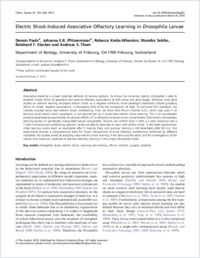Electric shock-induced associative olfactory learning in Drosophila larvae
- Pauls, Dennis Department of Biology, University of Fribourg, Switzerland
- Pfitzenmaier, Johanna E. R. Department of Biology, University of Fribourg, Switzerland
- Krebs-Wheaton, Rebecca Department of Biology, University of Fribourg, Switzerland
- Selcho, Mareike Department of Biology, University of Fribourg, Switzerland
- Stocker, Reinhard F. Department of Biology, University of Fribourg, Switzerland
- Thum, Andreas S. Department of Biology, University of Fribourg, Switzerland
-
08.03.2010
Published in:
- Chemical Senses. - 2010, vol. 35, no. 4, p. 335-346
English
Associative plasticity is a basic essential attribute of nervous systems. As shown by numerous reports, Drosophila is able to establish simple forms of appetitive and aversive olfactory associations at both larval and adult stages. Whereas most adult studies on aversive learning employed electric shock as a negative reinforcer, larval paradigms essentially utilized gustatory stimuli to create negative associations, a discrepancy that limits the comparison of data. To overcome this drawback, we critically revisited larval odor–electric shock conditioning. First, we show that lithium chloride (LiCl), which was used in all previous larval electric shock paradigms, is not required per se in larval odor–electric shock learning. This is of considerable practical advantage because beside its peculiar effects LiCl is attractive to larvae at low concentration that renders comparative learning studies on genetically manipulated larvae complicated. Second, we confirm that in both a 2-odor reciprocal and a 1-odor nonreciprocal conditioning regimen, larvae are able to associate an odor with electric shock. In the latter experiments, initial learning scores reach an asymptote after 5 training trials, and aversive memory is still detectable after 60 min. Our experiments provide a comprehensive basis for future comparisons of larval olfactory conditioning reinforced by different modalities, for studies aimed at analyzing odor–electric shock learning in the larva and the adult, and for investigations of the cellular and molecular substrate of aversive olfactory learning in the simple Drosophila model.
- Faculty
- Faculté des sciences et de médecine
- Department
- Département de Biologie
- Language
-
- English
- Classification
- Biological sciences
- License
-
License undefined
- Identifiers
-
- RERO DOC 17626
- DOI 10.1093/chemse/bjq023
- Persistent URL
- https://folia.unifr.ch/unifr/documents/301407
Other files
Statistics
Document views: 130
File downloads:
- Document: 185
- Supplementary material: 186

